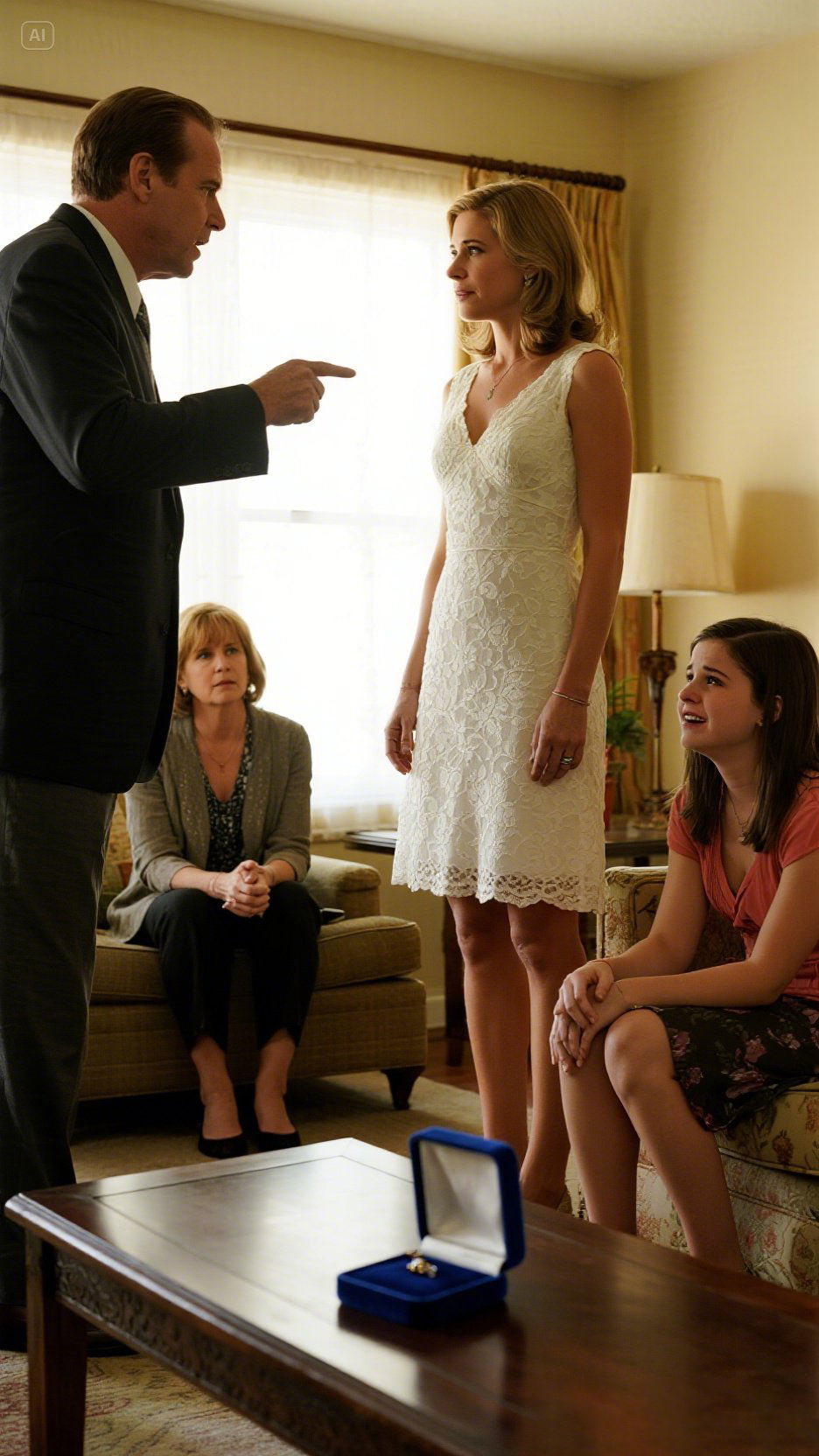The Unseen Anchor
My name is Rebecca Martinez, and until last month, I thought family meant having each other’s backs, no matter what. Then my sister, Olivia, accused me of stealing her $8,000 necklace, and my parents believed her without a second thought. My dad’s words still ring in my ears, cold and sharp: “Get out of my house if you’re going to lie to our faces.”
Little did they know, I was the one silently paying for that house. For the mortgage, the utilities, and yes, for Olivia’s entire college tuition.
A Daughter’s Duty
Growing up as the eldest in the Martinez family came with a clear set of expectations. “Family is forever,” my dad, Miguel, would say over Sunday dinners. “When everything else falls away, blood remains.” Those words became my mantra.
We lived in a modest home in Connecticut, purchased when my dad’s construction company was thriving. But the 2008 recession hit us hard. Dad’s business collapsed, and the shame of it weighed on him heavily. As if that wasn’t enough, my mom, Anna, was diagnosed with rheumatoid arthritis. The medical bills piled up, and they mortgaged the house twice just to stay afloat.

By the time I graduated from college in 2018, they were barely making ends meet, though they hid it well. Olivia, seven years my junior, was shielded from our financial decline. While I had part-time jobs and used textbooks, Olivia got new clothes, the latest phones, and a car for her 16th birthday. I never resented her for it; it was the reality our parents created.
After landing a great job in tech, I quickly climbed the ladder. By 25, I was a senior developer making six figures. It was during a visit home three years ago that I discovered how dire things had become. I overheard my dad in the garage, pleading with the mortgage company for an extension. I later found him in his old truck, head in his hands, crying silently.

That night, everything changed. He confessed they were months behind on everything, with Olivia’s $45,000-a-year private university tuition looming. They had promised her they could cover it, unwilling to admit they had failed.
So, I made a decision. I offered to “help” with some bills. Dad reluctantly agreed, but with one condition: Olivia must never know.
What started as “helping” quickly became a complete takeover. Within six months, I was paying their mortgage, all utilities, property taxes, and most of Mom’s medical bills. When Olivia started college, I covered her full tuition. All told, I was contributing over $70,000 a year—nearly two-thirds of my take-home pay. I’d bring groceries, claiming they were “on sale,” and purchased every major gift they gave Olivia, including her latest MacBook Pro.
Seeing them happy, I told myself, was enough.
For her 20th birthday two months ago, Olivia wanted an $8,000 white gold and diamond necklace. “It’s an investment piece,” she’d declared, “something I’ll keep forever.” That “something,” of course, came from me. I transferred the money to my dad, and a week later, I watched Olivia unwrap the velvet box.
“You’re the best parents ever!” she squealed, admiring her reflection. I smiled and took photos, ignoring the familiar ache in my chest. I never imagined that necklace would become the weapon that destroyed the very family I had sacrificed so much to preserve.
The Accusation
That particular Sunday started like any other. I was helping Mom with her famous enchiladas when, halfway through dinner, Olivia put down her fork.
“Has anyone seen my necklace?” she asked, a hand flying to her bare throat. “The diamond one. I can’t find it in my jewelry box.”
A frantic search began. The more we looked, the more agitated Olivia became. But I noticed a subtle shift in her gaze. Her eyes followed me from room to room. When we returned to the table, the air was thick with unspoken tension.
“You were in my room earlier, weren’t you, Rebecca?” she asked suddenly, her voice sharp.
“No,” I said, confused. “I came straight to the kitchen. I went upstairs to use the bathroom once, but I didn’t go in your room.”

“That’s strange,” Olivia mused, “because my door was open, and I always close it.”
The implication hung in the air like poison. “Olivia,” I said carefully, “if you’re suggesting what I think you are, you’re wrong. I didn’t take your necklace.”
“It’s an $8,000 necklace,” she retorted. “It doesn’t just disappear.”
“Rebecca, no one’s accusing you,” Dad said, yet his tone suggested otherwise. “But you have to admit, it’s a coincidence that it goes missing on a day you visit.”
I was stunned. “I visit twice a week, every week. Are you seriously suggesting I would steal from my own sister?”
“Of course not,” Mom murmured, refusing to meet my eyes.
The rest of the night was a blur of veiled accusations and my increasingly desperate denials. The next morning, I drove over to clear the air, but the situation had escalated.
“Then how do you explain this?” Olivia demanded, holding up the empty blue velvet box. “I found it in your old bedroom, shoved under the bookshelf.”
“That’s impossible!” I cried.
“The box didn’t walk there on its own,” Dad said, his voice hard. “Rebecca, if you’re in some kind of financial trouble, you should have come to us.”
The irony was so staggering I almost laughed. While they speculated about my motives, my phone buzzed with a payment reminder for their mortgage. Out of habit, I authorized the $3,000 transfer right there, an invisible act of support even as I was being condemned.
The final act was a “family discussion” that evening. My aunt, uncle, and a cousin were there, a jury already convinced of my guilt.
“I’ve been doing some research,” Olivia announced, her voice trembling theatrically. “The pawn shop downtown doesn’t require ID for items under $10,000.”
It was a setup. My cousin suggested searching my car. Defeated, I handed over my keys. In the trunk, under a grocery bag, was the blue velvet box. It had been planted.
“Still going to deny it?” Dad asked, his face a mask of disappointment.
“I think we’ve seen enough,” he said, his voice cold. “Rebecca, I want you to leave. Don’t contact us until you’re ready to admit what you did.”
I looked at my mother for support, but she turned away. Olivia stood in the background, and for a split second, I saw it—not sadness, but a flicker of pure, triumphant satisfaction.
As I was leaving, she pulled out her phone. In the reflection of the dark screen, just for an instant before she tilted it away, I saw it: the unmistakable glint of her diamond necklace, tucked just beneath the collar of her sweater.
She had it all along. The whole drama was a lie.
I opened my mouth to scream, to expose her, but then I looked at their faces. They wouldn’t believe me. My word meant nothing. In their eyes, I was already a thief.
The Reckoning
The next morning, the emotional storm had passed, leaving a cold, hard clarity. I opened my laptop and created a spreadsheet, detailing every dollar I had given them over the past three years.
- Mortgage Payments: $108,000
- Utilities: $12,600
- Property Taxes: $22,500
- Mom’s Medical Bills: $47,800
- Olivia’s Tuition & Expenses: $151,200
- Miscellaneous Support: $35,000
The grand total made me physically ill: $377,100. Enough for a house of my own. Enough to have secured my future.
I consulted a financial advisor and a lawyer. Both confirmed what I needed to hear: I had zero legal obligation to continue the payments. My support had been a gift, not a contract.
Then came the final piece of the puzzle. A call from Melissa, Olivia’s old roommate.
“I overheard something,” she said, her voice hesitant. “Olivia was at a coffee shop, bragging to her friends. She said, and these were her exact words, ‘I finally got rid of Rebecca.’ She was laughing about how she hid the necklace to make you look bad, so your parents would stop comparing her to you.”
The confirmation didn’t hurt. It fueled me.
With newfound determination, I began a systematic cancellation of every automatic payment tied to my family. The mortgage, the utilities, the tuition installment for Olivia’s upcoming semester—all of it, gone.
I then drafted a formal, unemotional letter detailing the exact financial support I had provided, with copies of bank statements and payment confirmations as proof. I informed them that, effective immediately, all such support was terminated.
They had made their choice. Now, they would live with the consequences.
The Fallout
Three days after I mailed the letter, the first call came. It was my father, his voice a cocktail of panic and rage.
“What the hell is this, Rebecca? Some kind of joke?”
“It’s not a joke, Dad,” I replied calmly. “This isn’t revenge. It’s a consequence.”
“We relied on that money!” he shouted.
“Yes, you did. Without ever acknowledging it, without ever thanking me, and without ever telling Olivia that her education was paid for by the sister she framed.”
I told him I knew Olivia had the necklace all along. A long, stunned silence followed. “You can’t just cut us off without warning!” he finally sputtered.
“I think I’ve been more than reasonable for three years,” I said, and hung up.
My mother called next, crying about missed payment notices. Olivia sent a barrage of texts, calling me selfish and vindictive. I ignored them all.
Three weeks after sending the letter, my mom asked to meet for coffee. She looked tired, aged.
“Olivia confessed,” she said, her fingers shredding a napkin. “She was jealous. Jealous that Dad always talked about how successful you were. She thought if she made you look bad, they’d stop comparing her to you.”
“I know,” I said. “I saw the necklace.”
Her eyes widened. “You knew? Why didn’t you say anything?”
“Would you have believed me?”
She looked down, ashamed. Her apology, I noted, came only after weeks of financial hardship.
“How are things?” I asked.
“Difficult,” she admitted. “Your father had to ask for an advance at work. Olivia had to drop two classes and get a job at the campus bookstore.”
“And the necklace?” I asked.
Mom sighed. “She sold it. About a week after you left. She needed money for a spring break trip.”
The irony was almost too perfect. She had accused me of stealing the necklace, only to sell it herself the moment her cash flow dried up.
A New Foundation
Six months have passed. My family is slowly, painfully, learning to stand on its own feet. They downsized to a smaller apartment. Olivia is working two jobs to pay for her reduced course load. Dad is taking night classes to update his skills.
Our relationship is tentative, fragile, but for the first time, it’s honest. There are no more unspoken arrangements, no more illusions. We are just people, forced to relate to each other without the buffer of my financial support.
As for me, I’m not just rebuilding my savings; I’m rebuilding my life. I started therapy, joined a hiking club, and reconnected with friends. I earned a promotion at work, and for the first time, that extra income is mine. I’m looking at investment properties—a dream I had put on hold for years.
The journey has been painful, but necessary. I learned that true family supports each other’s growth, not their stagnation. That real love doesn’t require silent, endless sacrifice. And that self-respect isn’t selfish—it’s the foundation upon which every healthy relationship must be built.
